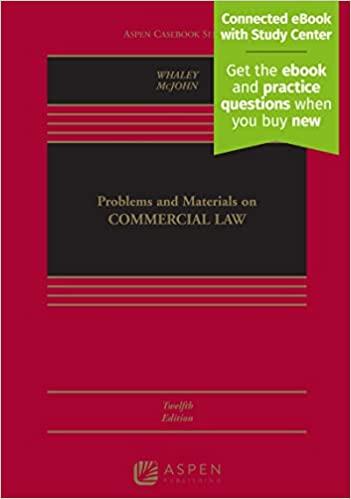Question
Anthony sold a 160 acre tract of land to Melissa in 1983. In the deed of conveyance, Anthony reserved all subsurface rights to oil, gas,
Anthony sold a 160 acre tract of land to Melissa in 1983. In the deed of conveyance, Anthony reserved all subsurface rights to oil, gas, and minerals. Since then, Melissa has maintained a single-family residence on the property and has farmed the 159 acres not immediately surrounding the house. This year Melissa contracted to sell the property to Frank for $600,000. The contract is silent on the matter of marketability of title but calls for Melissa to convey the property in fee simple absolute. At closing she presented Frank with such a deed, making no exception for any oil, gas, or mineral rights. At closing, Frank's lawyer, Lisa, in her attorney's opinion objected to the marketability of the title because she examined title and found the reservation of rights in Anthony. Melissa responds by asserting that she acquired full marketable title to the property by adverse possession. Generally the law is that adverse possession law does not treat farming as adverse to mineral development because farming does not physically interfere with any minerals that may lie below the surface. Assume that Melissa takes a hard position on marketable title and insisted that Frank must close on the contract or lose his $25,000 deposit. Lisa maintains her position that the title to the property is unmarketable because of the cloud created by the oil, gas, and mineral reservation in Anthony. Consequently Frank refuses to close and sues Melissa for return of his deposit. The trial court deciding the case determines that Melissa has indeed attained full fee simple absolute title to the property, including the rights to the oil, gas, and minerals, and denies Frank's claim to return of the deposit. Is Lisa the attorney liable to Frank for his loss of his deposit? Would the result be different if the contract provided that Melissa would convey a good fee simple record title to the property? What if a title insurance company looks at the facts and says that it is willing to insure title on the basis of adverse possession?
(Majority jurisdiction applied here)
Step by Step Solution
There are 3 Steps involved in it
Step: 1

Get Instant Access to Expert-Tailored Solutions
See step-by-step solutions with expert insights and AI powered tools for academic success
Step: 2

Step: 3

Ace Your Homework with AI
Get the answers you need in no time with our AI-driven, step-by-step assistance
Get Started


